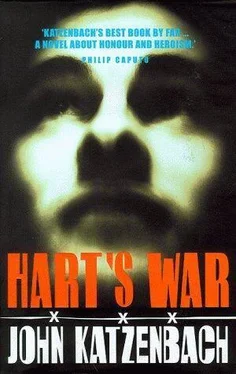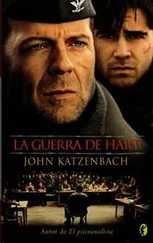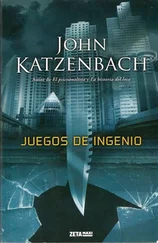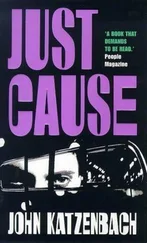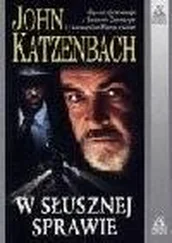John Katzenbach - Hart’s War
Здесь есть возможность читать онлайн «John Katzenbach - Hart’s War» весь текст электронной книги совершенно бесплатно (целиком полную версию без сокращений). В некоторых случаях можно слушать аудио, скачать через торрент в формате fb2 и присутствует краткое содержание. Жанр: Триллер, на английском языке. Описание произведения, (предисловие) а так же отзывы посетителей доступны на портале библиотеки ЛибКат.
- Название:Hart’s War
- Автор:
- Жанр:
- Год:неизвестен
- ISBN:нет данных
- Рейтинг книги:5 / 5. Голосов: 1
-
Избранное:Добавить в избранное
- Отзывы:
-
Ваша оценка:
- 100
- 1
- 2
- 3
- 4
- 5
Hart’s War: краткое содержание, описание и аннотация
Предлагаем к чтению аннотацию, описание, краткое содержание или предисловие (зависит от того, что написал сам автор книги «Hart’s War»). Если вы не нашли необходимую информацию о книге — напишите в комментариях, мы постараемся отыскать её.
Hart’s War — читать онлайн бесплатно полную книгу (весь текст) целиком
Ниже представлен текст книги, разбитый по страницам. Система сохранения места последней прочитанной страницы, позволяет с удобством читать онлайн бесплатно книгу «Hart’s War», без необходимости каждый раз заново искать на чём Вы остановились. Поставьте закладку, и сможете в любой момент перейти на страницу, на которой закончили чтение.
Интервал:
Закладка:
There were nearly ten thousand Allied prisoners of war held in the camp, split almost equally between two compounds, North and South. The U.S. fliers-all officers-were in the southern compound, while British and other Allies were situated to the North, a quarter mile away.
Passage between the camps, while not unusual, was mildly difficult. An escort and an armed guard and a compelling reason were necessary.
Of course, a compelling reason could be manufactured by the quick exchange of a couple of cigarettes passed to one of the ferrets, which was what the kriegies called the guards who roamed the camps, armed only with the sword-like steel probes they used to poke into the ground. The guards with the dogs were called by their official names, because the dogs scared everyone. There were no walls at the camp, but each of the compounds was surrounded by a twenty-foot-high fence. Two rows of barbed concertina wire on either side of a metal chain link.
Every fifty yards along the fence was a stolid, squat wooden tower.
These were manned around the clock by humorless and unbribable machine-gun crews, goons, with Schmeisser machine pistols hung around their necks.
Ten feet inside the main fence the Germans had strung a thin strand of wire from wooden stakes. This was the deadline.
Anyone crossing that line was assumed to be trying to escape, and would be shot. At least, that was what the Luftwaffe commandant told each prisoner upon arrival at Stalag Luft Thirteen. The reality was that the guards would let a prisoner, who donned a white smock with a red cross prominently centered on it, pursue a baseball or football if it rolled to the exterior fence, although sometimes, for amusement, they would wave a prisoner after the item, then fire a short burst into the air above his head or into the dirt at his feet. Walking the deadline was a favorite kriegie activity; the airmen would pace endless laps at the limit of their confinement.
The May sun rose rapidly, warming the faces of the men gathered on the parade ground. Tommy Hart guessed they had been standing in formation for nearly four hours, while steady processions of German officers and enlisted men had passed by, heading toward the collapsed tunnel. The enlisted men carried shovels and pickaxes. The officers wore frowns.
"It's the damn wood," a voice from the formation spoke.
"It gets wet, it gets rotten, won't hold up a damn thing."
Tommy Hart turned and saw that the man speaking was a wiry West Virginian, copilot on a B-l 7, and a man whose father had grown up working in the coal mines. He'd presumed the West Virginian, whose flat voice twanged with disgust, was prominent in escape planning. Men with knowledge of the earth-farmers, miners, excavators, even a funeral home director shot down over France who lived in the next hut over were enlisted in the efforts within hours of their arrival at Stalag Luft Thirteen.
He had made no efforts to escape the camp. Nor did he have any great desire to try, unlike many of the other men. It was not that he didn't want to be free, which he did, but that he silently knew that in order to escape he would have to descend into a tunnel.
And this he could not do.
He supposed his fear of enclosed spaces came from the time he accidentally locked himself inside a basement closet when he was no more than four or five. A dozen terrifying hours spent enclosed in darkness, in heat and tears, hearing his mother's distant voice calling to him yet unable to raise his own, he was so panicked. He probably would not have characterized the fear that remained with him from that day as claustrophobia, but that, in effect, was what it was. He'd joined the air corps at least in part because even in the tight confines of the bomber, he was still out in the open. The idea of being inside a tank or a submarine had been far more frightening to him than the fear of enemy bullets.
So, in the oddly uncertain prison world of Stalag Luft Thirteen, Tommy Hart knew one thing: If he ever did get out, it would have to be through the front gate. Because he would never voluntarily descend into a tunnel.
This made him think of himself as content although that was probably not the right word, more willing or resigned to wait for the end of the war despite the rigors of Stalag Luft Thirteen. He was occasionally enlisted as a stooge to take up a position where he could keep an eye on one of the ferrets, an -early warning system designed by the camp security officers. Any German walking within the camp was constantly followed and observed by a system of overlapping watchers, with redundant signaling methods. Of course, the ferrets knew they were being watched, and consequently tried their best to evade the security, constantly altering their routes, and their paths.
"Hey! Fritz Number One! How long you gonna keep us standing here?"
This voice bellowed with unmistakable authority. The man behind it was a fighter pilot from New York, a captain. The outburst was directed at a solitary German, dressed in the gray coveralls, with a soft campaign hat pulled down on his forehead, that was the standard ferret uniform.
There were three ferrets with the first name of Fritz and they were always addressed by their name and number, which irritated them immensely.
The ferret turned, eyeing the captain. Then he stepped up to the man, who stood at parade rest in the front row. The Germans had each block of the formation gather in rows of five, easier for counting.
"If you did not dig, captain, then there would be no need for standing here," he said in excellent English.
"Hell, Fritz Number One," the captain replied.
"We didn't do no digging. This was probably some more of your lousy sewage system that went and fell in. You guys ought to get some of us to show you how it's done."
The German shook his head.
"No, Kapitan, this was a tunnel. To escape is foolhardy.
Now it has cost two men their lives."
This news silenced the airmen.
"Two men?" the captain asked.
"But how?"
The ferret shrugged.
"They were digging. The earth falls in. They are trapped. Buried. A loss. Most foolish."
He raised his voice slightly, staring at the formation of his enemies.
"It is stupid. Dummkopf." He bent down, and scraped up a handful of muddy ground, which he squeezed between long, almost feminine fingers.
"This earth. Good for planting.
Growing food. This is good. Good for your games. These are good, too…" he gestured toward the compound athletic field.
"But not strong enough for tunnels."
The ferret turned back to the captain.
"You will not fly again, Kapitan, until after the war. If you live."
The captain from New York simply stared at the ferret hard, finally replying, "Well, we'll see about that, won't we?"
The ferret made a lazy salute, and started to move off, pausing only as he reached the end of the formation. There he had a quick exchange with another officer. Tommy Hart leaned forward and saw that Fritz Number One had reached out his. hand, and that a quick pair of cigarettes had been slipped to him. The man who had passed the smokes was a wiry, short, smiling bomber captain from Greenville, Mississippi, named Vincent Bedford, but he was the formation's expert negotiator and trader, and because of his skills had been nicknamed Trader Vic after the famous restaurateur.
Bedford had a thick, southern drawl, with an excitable quality to it.
He was an excellent poker player, a more than passable shortstop who'd done some time in the minor leagues. Before the war, he'd been a car salesman, which seemed appropriate. But what he truly excelled at was the commerce of Stalag Luft Thirteen, turning cigarettes and chocolates and tins of real coffee that arrived either in Red Cross parcels or packages from the States into clothing and other goods. Or he would take extra clothing and turn that into foodstuffs. No trade was beyond Vincent Bedford, and rarely did he come out on the wrong end of an exchange. And, in the unusual event that he had, then his gambler's instincts repaired his losses. A poker game could replenish his stock as effectively as a parcel from home. He seemed to trade in other items as well; always knowing the latest rumor, always getting the latest war news just slightly ahead of everyone else. Tommy Hart assumed that in his trades he'd somehow acquired a radio, but didn't know this for certain. What he did know was that Vincent Bedford was the man in Hut 101 to see. In a world where men had little, Vincent Bedford had amassed a prisoner-of-war-camp fortune, stockpiling coffee and foodstuffs and woolen socks and long underwear and anything else that might make life in the bag slightly more livable.
Читать дальшеИнтервал:
Закладка:
Похожие книги на «Hart’s War»
Представляем Вашему вниманию похожие книги на «Hart’s War» списком для выбора. Мы отобрали схожую по названию и смыслу литературу в надежде предоставить читателям больше вариантов отыскать новые, интересные, ещё непрочитанные произведения.
Обсуждение, отзывы о книге «Hart’s War» и просто собственные мнения читателей. Оставьте ваши комментарии, напишите, что Вы думаете о произведении, его смысле или главных героях. Укажите что конкретно понравилось, а что нет, и почему Вы так считаете.
